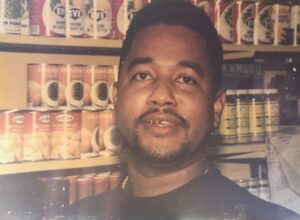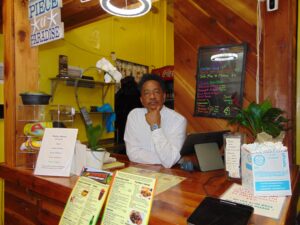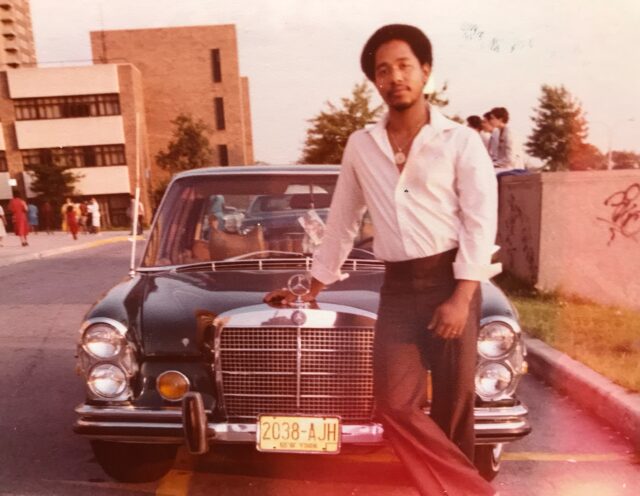By: Belle Doyle
Los Angeles, CA (The Hollywood Times) 3/2/24 – Chef Tony Hyde was a young man and restaurant entrepreneur, who immigrated from Jamaica, in West Palm Beach, Florida, when he was wrongfully incarcerated and nearly deported due to a cruel misconduct of justice against him by a group of officers in the United States Border Patrol.
“I remember I was driving to the mall; so, while driving to the mall, I was in the middle lane then I realized I was almost going to pass my exit, so I put my signal on and was about to exit. I realized there was a green truck behind me. So, as I’m exiting, I noticed the guys in the green truck bending their heads to see my license plate. I didn’t even think that’s what it was at the time, but they were just staring at me” says Chef Tony Hyde.
Chef Tony began to notice a green truck in the corner of the parking lot of his restaurant over the next few days; he would go outside to water his plants to see who it was in confusion of the ‘visitors.’ Within a week, he was in the kitchen of his restaurant cutting plantains when one of his waiters said someone was knocking on the front door; when the door was opened, Chef Tony could hear a group of men yelling out his name. Chef Tony stepped out from the kitchen, still holding the kitchen knife he was using to prep for service.
“I stepped out and I heard ‘he’s got a knife’ there are guns on me. I put the knife down and right away, they put handcuffs on me. Then from there, just verbally abusive, you f-ing N word, you f-ing Jamaican, f-ing anything that they could use to belittle me, they would use it.” said Hyde.
After, also, verbally abusing and questioning Hyde’s waiter, who was from Haiti on ‘how he got to the United States’; without a warrant, they went through Chef Tony’s restaurant and stole his legally purchased gun, took his car keys and went through his car. The group put him in the trunk of their green truck and drove him directly to his home, knowing exactly where he lived as they had been following him for a week. Using Chef Tony’s keys, the group of officers entered Chef Tony’s home, without a warrant and dragged his, at the time, girlfriend outside in her underwear and began to search inside where his son was sleeping. They, again, stole some of Hyde’s property. It was only then, when they revealed to him that they were from immigration and informed Chef Tony that they were going to deport him. The officers took Hyde to the police station where he remained in a cell for eight hours.
“When I was in there, one came and laughed at me. ‘You know why you’re here, right?’ they said. I said ‘no’ He said, ‘you cut the boss off in traffic. He came back to get your ass.” said Hyde.
 Hyde was transferred to the sheriff’s department. Some of his restaurant regulars were some of the police officers and sheriffs of where he was being held; they would come and ask Hyde why he was there. Hyde had no answer for them and was able to ask his former regulars to check to see why he was being held, and was told, in their system, there were no charges against him; the patrol officers who raided his business and home put a federal hold on him so, unfortunately, the sheriff’s department could not release him. After three weeks, Hyde asked one of his close friends to shut down his restaurant.
Hyde was transferred to the sheriff’s department. Some of his restaurant regulars were some of the police officers and sheriffs of where he was being held; they would come and ask Hyde why he was there. Hyde had no answer for them and was able to ask his former regulars to check to see why he was being held, and was told, in their system, there were no charges against him; the patrol officers who raided his business and home put a federal hold on him so, unfortunately, the sheriff’s department could not release him. After three weeks, Hyde asked one of his close friends to shut down his restaurant.
Hyde was later transferred along with a group of others to the Miami Krome Detention Center by one of the men who arrested him. Hyde was handcuffed in the back of a van and had to listen to the officer scream racial slurs on their drive-in transfer.
“When I got to the Krome Detention Center, it was a relief to get out of that van with this guy because my biggest fear was, he was going to pull over and maybe kill me and would say that I was trying to escape.” says Hyde.
The intake process took six hours where Hyde waited in a tiny room and eventually was marked as an aggravated felony; when Hyde was a boy of nineteen, he was arrested for having a little bit of marijuana, this is what they used as their ‘reasoning.’
Hyde was taken to a facility that housed five hundred men from different countries: a majority being from Jamaica, Cuba, Haiti, and the Dominican Republic. Days after his arrival, Hyde was in court, being supported by his mother and daughter, along with his friends and some of his former restaurant regulars from the police department with a letter from the mayor to support his innocence and wrongful incarceration. The judge ordered him deported and he was sentenced to go to Jamaica.
“My mother was emotional. My daughter was emotional and of course, I had tears in my eyes too. I hugged my mother and daughter and said, ‘Listen, the fight has just begun. I’m not just gonna go quietly.’ I decided, I was going to fight it.” says Hyde.
Hyde discovered that in the facility, there was a limited access library. It was there when he befriended a fellow inmate and also from Jamaica, David, who after his sentence was served, was ordered to be deported to Jamaica. The two of them continuously went to the library where David showed Hyde how to appeal his own case. They were able to type up an appeal and send it out.
The two were shortly transferred to a jail in Key West, Florida. When Hyde got off the bus during the transfer, a guard approached him with a paper to report any abuse or corruption in detention.
“‘Fill out the form and we will send it to the justice department.’ they told us.” says Hyde.
Hyde took the form, filled it out but instead, mailed it to his mother and asked her to send it to the justice department.
This intake process took two hours, it was an extremely confined building with no outside yard; only a small barbed wired area. Shake downs would often take place in this facility.
“I remember there was a Russian guy there; he and I became friends. As a matter of fact, he was trying to teach me a few words in Russian. We used to get an orange, or some kind of fruit and he would save the seed from the orange and use some cotton to grow the seed and it was growing into a little orange tree. Once these guys (the guards) saw this, they threw it on the ground and stepped on it like it was a roach.” says Hyde.
Hyde again was transferred; during transfer in Fort Lauderdale, he was forced to strip naked in front of the Fort Lauderdale police staff and was given a jumpsuit in a condition that was abominable.
“I remember they put us in these little jail cells that was like a Big Bird cage, there were four of us in each. We stayed there for two months; I think that was probably the longest stay that we had while we were being transferred from one place to another.” said Hyde.
He was taken back to Krome Detention Center where he learned that the form he filled out reporting abuse, which Hyde had mailed to his mother, had reached the justice department as someone from the department met with him at the center and interviewed him for over an hour where Hyde described everything in detail that occurred from the green truck in traffic in West Palm Beach to that point in time.
The abuse, however, did not end there. The day after his meeting with the justice department, Hyde was loaded onto a bus along with forty others. Two of the men driving were carrying shotguns. After a two-hour drive north, they pulled up to a jail facility where fear and fright overcame a majority of the group and they refused to get off the bus due to their past experiences in that jail where they were treated with racism and cruelty. The guards warned them that if they didn’t get off the bus, that ‘all hell is going to break loose.’ Fearfully, Hyde got off the bus along with ten to fifteen others. They were put in cells and heard commotion outside. Hours later, they were put back on the bus where Hyde could smell tear gas and saw blood was splattered all around. The other passengers were beaten up and bloody. Chained to this seat, Hyde was forced to sit in pepper spray and burned his leg. Hyde was taken back to the Krome Detention Center, it was there when Hyde had a dream that his companion, David, was deported and sure enough that same day, David was taken away.
After ten months, Hyde received a letter from the justice department informing him that he had been given a $30k bond to be released. Hyde, once again, representing himself, went to the facility’s library to learn how to put in a reduction of bond. Within three weeks, the bond was reduced to $1k. He informed his family and friends and his friend, Demetria Falcon, paid the bond. A week after, Tony Hyde was finally released.
“When I got out of there, it was so surreal. I didn’t even know it was true. I remember I actually bent down on the ground, and I kissed the ground. I kissed the ground because I didn’t think it was gonna be possible.” says Hyde.
Hyde sat on a bench waiting for his mother to pick him up. When a young woman approached him.
“While I was sitting there, I remember this girl came up to me and said, ‘aren’t you Tony?’ I’m looking at this girl like, how could you know I am Tony. She said, ‘when you had your restaurant, I came and asked you for a job. You said you didn’t have a job but that you would let me know if something opened up and I always remembered you.’” says Hyde.
The young woman, whose boyfriend was in the detention center, heard what happened and took him to get something to eat. Many rumors had been flowing around in West Palm Beach.
“There was one rumor that came out that I got deported to Jamaica and I hung myself. So many horrible rumors that came out.” says Hyde.
After his release, Hyde left Florida and moved to California while the appeal was going on in Virginia. He received a disturbing phone call from his mother regarding the same officers who placed the handcuffs on him in West Palm Beach, Florida.
“One morning, around 6:00 AM, my mother called me, and she said the same border patrol guys came to her house that morning and knocked on her door. When she opened the door, they ran inside her house; they looked under the bed, in the closet, searched the house looking for me because they found out I got out of there. The hatred that these people had for me was unbelievable and I’m sure if I was there, I would not be here today.” says Hyde.
Chef Tony has met many people who take advantage of his kindness and are often stealing his story and ideas; while he worked at Whole Foods, after an employee injury, Hyde developed the bracket that they now use throughout their locations.
 “After they started using it and realized how good it was, all of a sudden, this guy took the bracket and got somebody else to come in and copy it and distribute it to all the other locations.” says Hyde.
“After they started using it and realized how good it was, all of a sudden, this guy took the bracket and got somebody else to come in and copy it and distribute it to all the other locations.” says Hyde.
After moving to California, Hyde opened Sattdown Jamaican Grill where he shares his culture, compassion, and food; still giving kindness to all who pass through and has been ready to share his story.
 “I want my story to be told. Somehow, someway.”
“I want my story to be told. Somehow, someway.”






